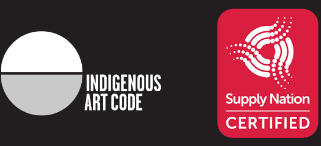
Five Lessons I Learned in My First Five Years of Business
Surviving the first five years
Five years ago, in August 2015, my husband and partner, Denis Keeffe and I launched our Aboriginal Australian fashion and gift brand, Mainie. Although we both left executive level roles to start our new venture, neither of us had a background in fashion design. Starting a fashion business has been a steep learning curve for both of us but our passion for what we are doing has never waned. Despite the enormous personal effort it has taken to survive our first five years, we are more committed than ever to seeing our dream to be a global brand become a reality.
Five years in business is a significant milestone to celebrate. It is also an opportune time to reflect on our journey so far. Looking back, there are five key pieces of advice about starting a business that I would give to my younger self if I knew five years ago what I know now.
1. Don’t get bogged down in planning. Although one of the key success factors behind the Mainie start-up was our meticulous planning, with five years of hindsight under my belt, I can readily concede that hardly anything worked out the way we had originally planned. The only way to plan is to allow for sufficient flexibility to be able to deal with any unforeseen opportunities and challenges. Sara Blakely, the founder and CEO of SPANX has said that she did not have a business plan when she launched her massively successful women’s underwear brand. Her start-up strategy involved just three simple steps, “Make it, sell it, build awareness.” I couldn’t agree more. Focus your early business planning on getting your product concept right, and then launch into your target market as quickly as you can. With regard to moving out of the start-up phase and into the business growth phase, I should add here that if you are planning to take any money out of your business in the first few years, you will probably be disappointed. Be satisfied that you are selling well enough to be able to cover your costs and still have a tidy surplus left over to invest back into growing your business. Everything you do once you have started selling your products should be about establishing the strength of your brand and expanding into broader markets.
2. You have to make mistakes. Do not let the fear of failure hold you back from getting started. Fortune favours the brave so be bold, dig as deep as you can into your own resources and have a go. Sometimes the only way you will find out whether something will work or not is to just try it and see. You must take risks and be ready to face the consequences whether you win or lose. You can best manage risk by keeping a close eye on every aspect of your business, particularly the finances. The cost to take your business idea from the concept phase through to launch will be substantial. Make sure you have adequate financial resources to properly capitalise your start up. Do not fund your start-up with borrowed money. Mistakes can be expensive, but it is better to lose your own money than to burn others and incur insurmountable debts before you even get started. If you try something and it works – great! Stick with it. But if it fails, do not waste time beating yourself up or blaming others, just learn the lesson, pull yourself together and move on as soon as you can. Make allowances for contingencies but do not let budgets blow out. Never try to hide mistakes. Be honest and open. Do not put things off. Intervene early when you see a problem and be prepared to make the tough decisions. Once you have tested that something is not going to work, do not hesitate to terminate futile projects, write off your losses and start again. Most importantly of all, choose to be positive no matter how many setbacks you encounter. It will not be easy but stick with it because it will be worth it. Do not give up.
3. Get the right people on the bus and the wrong people off the bus. Ultimately your business can only be as good as the people who are working with you. Surround yourself with talented and motivated people, who care about your business as much as you do. Great employees are your most valuable assets so treat them with the care and respect they deserve. Loyalty is a wonderful quality but also be aware that talented people are usually ambitious and invariably attracted to new and bigger challenges. They will not hesitate to seize better opportunities elsewhere if and when they are offered. Do not waste precious time and valuable resources by hiring inexperienced people with the view that they will “grow” with your business. You cannot afford to experiment with people who do not deliver the immediate results you need. If you want professional results, you will need to engage professionals with extensive experience in your industry or similar fields – people who can hit the ground running and take charge straight away. Do not trust first impressions. Check references. If you are engaging a salesperson, verify that they have a proven record in sales. If you are looking for someone to build your ecommerce site, ask to see examples of their work for businesses like yours. Before you engage anyone to manage vital aspects of your business such as sourcing, marketing or branding, confirm that they have a solid client list of known brands similar to yours. Contact those clients and ask if they would recommend that person. Make sure that any agreement you have with outsourced contractors allows you to terminate the project if KPIs are not being met. Do not make an offer of employment to anyone who cannot demonstrate that they fulfil all the requirements of the role. Just as it is hard to keep your star performers, it can also be difficult to move on mediocre or poor performers. Invest in an dedicated HR management service that ensures that all your recruitment, employment contract terms and conditions, wages, OHS and termination procedures are compliant with legislation, and most importantly, indemnifies you in the case of a legal dispute.
4. Keep your eye on the bottom line. Nothing will sink your business faster than loose financial management. No matter how big your business grows, you should be aware of incomings and outgoings on a daily, weekly, monthly, quarterly and yearly basis. Cashflow management is imperative. Run regular reports across all your sales points – consignment, wholesale, retail and online to identify trends. Significant and prolonged drops in revenues against forecasts should be addressed as a matter of priority. Find out why revenues are falling and fix the problem. If you can't turn around a poor performing sales outlet, shut it down as quickly as you can and move those resources to a more profitable division. Go through expenditures with a fine-tooth comb. If you are struggling to make ends meet, cut expenses to the bone. When you are starting out, there should be minimal expenditure on items that do not directly result in either a sales or brand development outcome. If money is tight, look for things that you could be doing yourself, rather than paying others e.g. basic office admin tasks, cleaning, graphic design, photography etc? Watch those little things like donations, sponsorships, subscriptions, memberships. They feel good but are they necessary to the running of the business? When you add them all up at the end of the year, ask yourself, could this money be spent more effectively on something else? Heed the old saying, “You have to buy right to sell right”. Make sure you are buying at the best price. Negotiate hard with suppliers to get the best deal that you can. Healthy gross profit figures do not automatically carry over to your bottom line, especially if your costs are too high and your prices are too low. Develop a price analysis formula that lays out achievable and sustainable mark ups from the cost of goods to wholesale price to recommended retail price. Add formulae that can give you an immediate report on any changes in costs that might occur in your supply chain. If you are manufacturing offshore, be aware that fluctuations in the value of the Australian dollar will affect your calculations. It is also important that your forecasts and reports account for the discounts you offer to your customers. Assume that not all your stock will sell at full price. Be prepared to rework your forecasts to allow for the clearance of slow-moving stock at heavily discounted prices. Closely monitor your stock levels. Inventory is an asset but if it is not turning over quickly, then it becomes a deadweight tying up much needed working capital. Keep a close eye on your debts. Always pay on time and if you cannot, talk to your creditors straight away and work out a deal. They are businesspeople and have cashflow issues too. Set effective credit policies for your customers. Do not extend more credit to people who already owe you money. Finally, never underestimate the value of your equity in the business. You have worked long and hard and invested everything have in your business so do not give it away. You will be approached by ‘middlemen’ such as sourcing agents, sales agents and distributors, business development consultants etc, who will suggest a small percentage, one or two percent of your equity as part of their fees. Don’t do it. You will need every percentage of that equity later as your business growth accelerates, and you endeavour to attract genuine investors. Only sell equity in your business to investors who share your passion and your values. Bear in mind, that once your equity falls below 51 percent, you have lost control of your company.
5. Be open, honest and transparent. Just as poor financial management will quickly sink a business, so too will bad governance. Set everything up the right way from the very beginning. Do not cut corners. Make certain that every aspect of your business from your sourcing, manufacturing, financial dealings, HR management etc is above board and will withstand scrutiny. Good record keeping is essential to ensuring probity in all your dealings. There is no such thing as a ‘paper free’ office. By all means, file electronic copies of essential documents in backed-up desktop and cloud storage systems, but also take care that all original paper copies of legal documents are securely stored. Set up reminders in your calendar for commencement, expiry, renewal and other important dates on legal documents such as company registration, business name and number, trademarks, licenses, domains, software systems, agents’ agreements, personnel contracts, loans and leases etc. Ensure that your outsourcing arrangements are covered by formal agreements with clearly outlined deliverables for both parties. If you seek professional advice on any matter, make sure you get it in writing. Keep your own verbal and written communications professional, accurate and courteous. Remember that if a dispute arises, your own words could be read back to you in front of a judge. Carefully read any agreement before you sign it and seek professional legal advice if required. Finally, it is inevitable that even if you always do your best, you will not always get the result you wanted. There are shonks out there and plenty of traps for new players but don’t let setbacks discourage you. Learn the lessons and grow from the experience. The main thing is to keep going.
Posted by Charmaine












